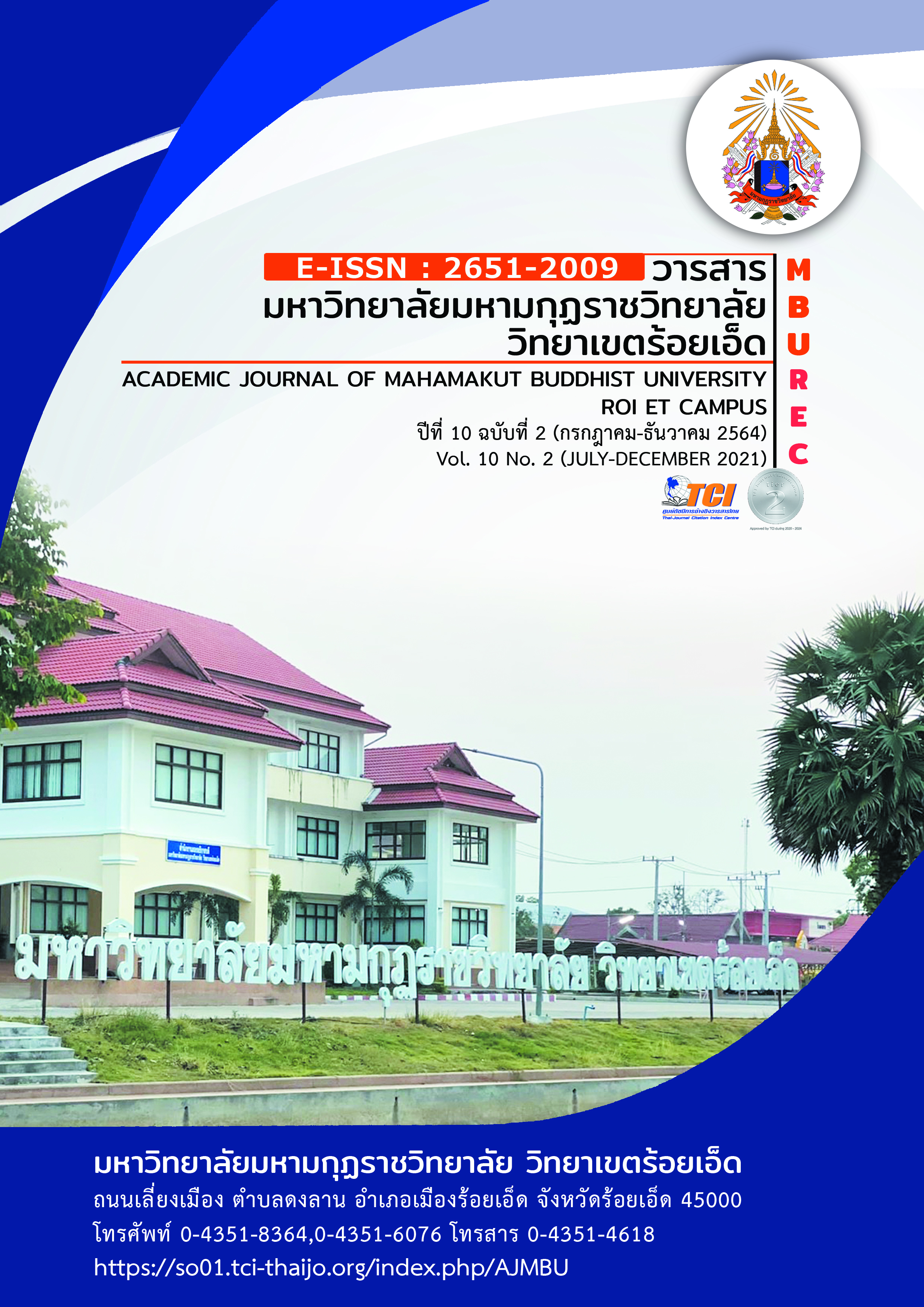Academic Instructional Leadership According to the Ten Royal Virtues
Main Article Content
Abstract
The objective of this article is to study the academic leadership especially according to the ten royal virtues since the leaders should rely on leadership as a driving force for organizational development, meanwhile the leaders should be aware of the Buddha dharma principles for successful administration based on the ten royal virtues which can be used for leadership development.
Article Details
How to Cite
Ladawan, K. (2021). Academic Instructional Leadership According to the Ten Royal Virtues. Academic Journal of Mahamakut Buddhist University Roi Et Campus, 10(2), 912–922. retrieved from https://so01.tci-thaijo.org/index.php/AJMBU/article/view/252649
Section
Academic Article
References
กระทรวงศึกษาธิการ. (2553). หลักสูตรแกนกลางการศึกษาขั้นพื้นฐาน พุทธศักราช 2551. พิมพ์ครั้งที่ 3. กรุงเทพมหานคร : โรงพิมพ์ชุมนุมสหกรณ์การเกษตรแห่งประเทศไทย.
ปรียาพร วงศ์อนุตรโรจน์. (2553). การจัดและบริหารอาชีวศึกษา. กรุงเทพมหานคร : ศูนย์สื่อเสริมกรุงเทพ.
พระธรรมปิฎก (ป.อ.ปยุตฺโต). (2546). พุทธธรรม ฉบับปรับปรุงและขยายความ. พิมพ์ครั้งที่ 9. กรุงเทพมหานคร : มหาจุฬาลงกรณราชวิทยาลัย.
พสุ เดชะรินทร์. (2551). หมวด 2 การวางแผนเชิงกลยุทธ์ศาสตร์. กรุงเทพมหานคร : วิชันพริ้น แอนด์มีเดีย.
ภาวิดา ธาราศรีสุทธิ. (2547). คุณลักษณะ คุณสมบัติความสามารถของผู้บริหารโรงเรียนมัธยมศึกษา สังกัดกรมสามัญศึกษากระทรวงศึกษาธิการ. กรุงเทพมหานคร : กระทรวงศึกษาธิการ.
รุ่งนภา นุตราวงศ์. (2552). หลักสูตรอิงมาตรฐาน การพัฒนาสู่คุณภาพ. วารสารวิชาการ. 4(4). 57-60.
วรภาส ประสมสุข และนิพนธ์ กินาวงศ์. (2550). หลักการบริหารการศึกษาตามแนวพุทธธรรม. วารสารศึกษาศาสตร์. 18(2). 63-84.
วิเชียร ทองคลี่. (2554). การศึกษาความสัมพันธ์ระหว่างภาวะผู้นำทางวิชาการของผู้บริหารสถานศึกษากับการจัดการเรียนรู้ในโรงเรียน สังกัดสำนักงานเขตพื้นที่การศึกษามัธยมศึกษา เขต 31. วิทยานิพนธ์ครุศาสตรมหาบัณฑิต สาขาวิชาการบริหารการศึกษา. มหาวิทยาลัยราชภัฏนครราชสีมา.
อัศนีย์ สุกิจใจ. (2560). ภาวะผู้นำทางวิชาการของผู้บริหารสถานศึกษา. วารสารวิจัยพุทธศาสตร์. 3(1). 23-37.
Bamburg, J. & Andrews, R. (1990). The Principal as Instructional Leader. School Effectiveness and School Improvement. 2(3). 175-191.
Buzzi, Michael Joseph. (1991). The Relationship of school Effectiveness to Selected Dimensions of Principals’ Instructional Leadership in Elementary School in the State of Connecticut. Dissertation Abstracts International. 51. 3167-A.
Daft, R. L. (1999). Leadership Theory and Practice. New York : Dryden Press.
Heck, R. H., et al. (1990). Instructional Leadership School Achievement : Validation of a Causal Model. Educational Administration Quarterly. 56. 94-125.
Hopkins WG. (2008). Research Designs : Choosing and Fine-tuning a Design for Your Study. Sport science. 12(2). 12–21.
Kroeze, D.J. (1989). The Principal as Instructional Leader. Michigan : University of Michigan.
Larson, M.& Luthans, F. (2006). Potential Added Value of Psychological Capital in Predicting Work Attitude. Journal of Leadership and Organizational Studies. 13(1). 75-92.
Lashway, M. (2002). Blended learning and sense of community: a comparative analysis with traditional and fully online graduate course. Retrieved 5 August 2009. From http://www.irrodl.org/content/v5.2/rovai-jordan.html
McEwan, E. K. (1998). Seven Steps to Effect Instructional Leadership. California : Corwin Press.
Rutherford, D. (1987). Removing Administrative Impediments to Instructional Improvement Efforts. New York : McGraw-Hill.
Rutherford, D. (1987). Removing Administrative Impediments to Instructional Improvement Efforts. New York : McGraw-Hill.
Yukl, G. A. (2002). Leadership in Organizations. 4th ed. Englewood Cliff, New Jersey : Prentice-Hall.
ปรียาพร วงศ์อนุตรโรจน์. (2553). การจัดและบริหารอาชีวศึกษา. กรุงเทพมหานคร : ศูนย์สื่อเสริมกรุงเทพ.
พระธรรมปิฎก (ป.อ.ปยุตฺโต). (2546). พุทธธรรม ฉบับปรับปรุงและขยายความ. พิมพ์ครั้งที่ 9. กรุงเทพมหานคร : มหาจุฬาลงกรณราชวิทยาลัย.
พสุ เดชะรินทร์. (2551). หมวด 2 การวางแผนเชิงกลยุทธ์ศาสตร์. กรุงเทพมหานคร : วิชันพริ้น แอนด์มีเดีย.
ภาวิดา ธาราศรีสุทธิ. (2547). คุณลักษณะ คุณสมบัติความสามารถของผู้บริหารโรงเรียนมัธยมศึกษา สังกัดกรมสามัญศึกษากระทรวงศึกษาธิการ. กรุงเทพมหานคร : กระทรวงศึกษาธิการ.
รุ่งนภา นุตราวงศ์. (2552). หลักสูตรอิงมาตรฐาน การพัฒนาสู่คุณภาพ. วารสารวิชาการ. 4(4). 57-60.
วรภาส ประสมสุข และนิพนธ์ กินาวงศ์. (2550). หลักการบริหารการศึกษาตามแนวพุทธธรรม. วารสารศึกษาศาสตร์. 18(2). 63-84.
วิเชียร ทองคลี่. (2554). การศึกษาความสัมพันธ์ระหว่างภาวะผู้นำทางวิชาการของผู้บริหารสถานศึกษากับการจัดการเรียนรู้ในโรงเรียน สังกัดสำนักงานเขตพื้นที่การศึกษามัธยมศึกษา เขต 31. วิทยานิพนธ์ครุศาสตรมหาบัณฑิต สาขาวิชาการบริหารการศึกษา. มหาวิทยาลัยราชภัฏนครราชสีมา.
อัศนีย์ สุกิจใจ. (2560). ภาวะผู้นำทางวิชาการของผู้บริหารสถานศึกษา. วารสารวิจัยพุทธศาสตร์. 3(1). 23-37.
Bamburg, J. & Andrews, R. (1990). The Principal as Instructional Leader. School Effectiveness and School Improvement. 2(3). 175-191.
Buzzi, Michael Joseph. (1991). The Relationship of school Effectiveness to Selected Dimensions of Principals’ Instructional Leadership in Elementary School in the State of Connecticut. Dissertation Abstracts International. 51. 3167-A.
Daft, R. L. (1999). Leadership Theory and Practice. New York : Dryden Press.
Heck, R. H., et al. (1990). Instructional Leadership School Achievement : Validation of a Causal Model. Educational Administration Quarterly. 56. 94-125.
Hopkins WG. (2008). Research Designs : Choosing and Fine-tuning a Design for Your Study. Sport science. 12(2). 12–21.
Kroeze, D.J. (1989). The Principal as Instructional Leader. Michigan : University of Michigan.
Larson, M.& Luthans, F. (2006). Potential Added Value of Psychological Capital in Predicting Work Attitude. Journal of Leadership and Organizational Studies. 13(1). 75-92.
Lashway, M. (2002). Blended learning and sense of community: a comparative analysis with traditional and fully online graduate course. Retrieved 5 August 2009. From http://www.irrodl.org/content/v5.2/rovai-jordan.html
McEwan, E. K. (1998). Seven Steps to Effect Instructional Leadership. California : Corwin Press.
Rutherford, D. (1987). Removing Administrative Impediments to Instructional Improvement Efforts. New York : McGraw-Hill.
Rutherford, D. (1987). Removing Administrative Impediments to Instructional Improvement Efforts. New York : McGraw-Hill.
Yukl, G. A. (2002). Leadership in Organizations. 4th ed. Englewood Cliff, New Jersey : Prentice-Hall.


